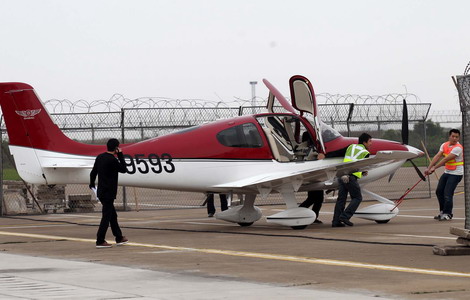 |
|
|
|
|||||||||||
|
 Staff workers of Zhuhai Xirui General Aviation Company transport a Cirrus aircraft in Zhuhai, Guangdong province, on Friday.?[Photo / China Daily] |
Industry players need to invest in infrastructure
The mainland's first fixed-base operator service for private jets was launched in Zhuhai, Guangdong province, last week, which insiders called a breakthrough in the second year of China's reform of airspace management.
But the boom of the private jet sector is yet to come, they said, demanding more policy support from the government and more investment in infrastructure by industry players.
A fixed-base operator usually provides aircraft sales, storage, repair and maintenance, and sales of aircraft parts, among other services.
Chen Shaochang, general manager of Zhuhai Xirui General Aviation Company, which launched the service, said it will open more fixed-base operator facilities in Shenyang, Dandong, Jilin and Daqing in Northeast China in the following years.
A network of 40 such facilities is expected to take shape by 2020, which will facilitate those who commute between cities in private jets, he said.
Previously, companies would sell aircraft, plane parts and fuel, but most stopped short of providing other services such as aircraft repair and maintenance.
"Most companies do not want to invest in such facilities, because they are afraid of losing money with so little business nowadays," said Jiang Li, chief China representative of US plane maker Cirrus.
At present, private jets in China cannot fly freely, because low-altitude airspace is under the control of the air force.
Any flight by non-commercial planes must go through a lengthy procedure before taking off. It is almost impossible for private jet owners to take off at short notice.
Private jet sellers believed that the restriction has dampened Chinese millionaires' enthusiasm to buy small jets, and have called for years for lifting the restrictions.
Last year, the air force started a reform that aims to open airspace under 1,000 meters in five to 10 years, which has bolstered the industry's confidence in the sector.
Liu Liangjun, general manager of Changsha-based GALink Aviation Technology, which has sold business jets and helicopters and aviation parts for more than 10 years, said that many new companies selling private jets have emerged in the past few years, with optimistic prospects based on a growing number of billionaires in China and the ongoing reform.
But most industry players also agreed that it's not the time yet to launch fixed-base operator services in China, he said.
"Few private jets are actually used to commute between cities and demand such services, but the cost is huge for the operator," he said.
In addition, it is not easy for potential service providers to get qualifications from authorities to provide repair and maintenance service, and building airports for small planes needs to go through complicated procedures, he said.
"The reform by the air force to open up low-altitude airspace is not enough. The civil aviation administration should also do something to simplify and ease the approval procedures, and give actual support to the private jet sector," he said.
Jiang with plane maker Cirrus said that the current strict requirement imposed by the civil aviation administration is necessary, as safety is the priority.
"The industry players must be willing to invest hugely in the infrastructure and sacrifice current earnings," he said.
"Fixed-base operator facilities, similar to gas stations and highway rest areas, are infrastructure that must be built for the benefit of the industry. Without them, small jets cannot really fly freely, even after the airspace is open," he said.
China only has about 1,000 general aircraft, which include all kinds of non-commercial airplanes.
The United States has at least 210,000 private airplanes.
Xia Xinghua, deputy director of the Civil Aviation Administration of China, said last year that the fleet of general aircraft is expected to exceed 2,000 by 2015, including 600 private jets.
Contact the writers at zhengcaixiong@chinadaily.com.cn and xindingding@chinadaily.com.cn
Zhang Yiren contributed to this story.